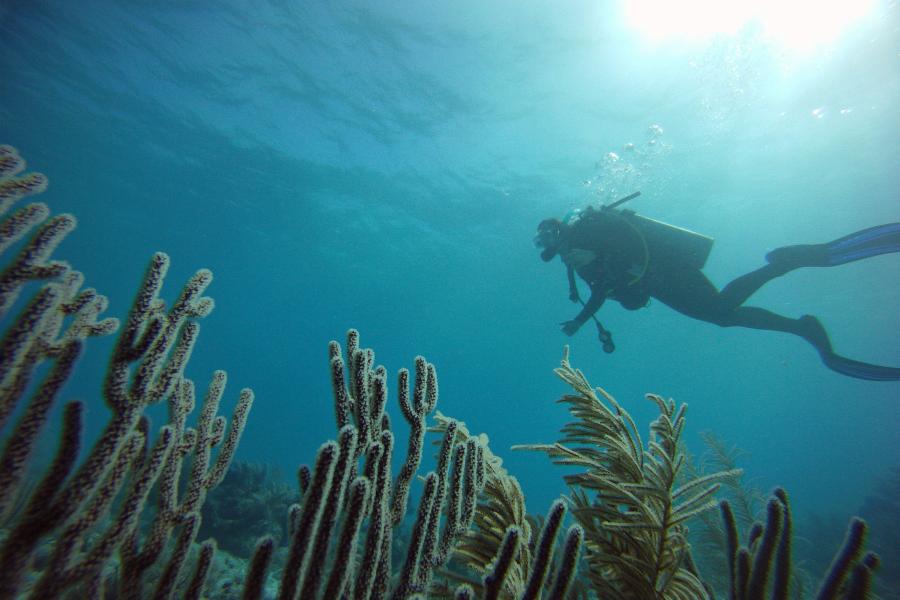About This Course
This MSc is a full-time one-year course, consisting of 9 months taught course and 3 months research project, and assessed by coursework and examinations. The course provides theoretical and practical training in measuring, quantifying and understanding the physical processes within the geological marine environment. It provides a sound scientific basis on which to decide how best to design and execute marine surveys, be they geophysical, sedimentological or geological, for the required purpose.
The MSc in Applied Marine Geoscience evolved from its predecessor, the Marine Geotechnics course which boasted a 30 year pedigree.
A series of modules have been designed to explain the processes that form and characterise a wide variety of sedimentary environments, from the littoral zone to the deep ocean. Those controls range from the dynamical, chemical, climatic to geological; all are inter-related. The student also gains knowledge and understanding of survey techniques in order to map these environments and thereby gain a better understanding of the processes that shape them. The final facet of the course involves an explanation of how these sedimentary materials react to imposed loads - how they behave geotechnically.
From past experience it is found that students on completion of the course will find employment in the offshore hydrocarbons industry, geophysical contract companies (both offshore and terrestrial), geotechnical engineering companies, river and harbour boards or government establishments. The course may also lead students to further academic research studies.
Programme Length
1 year full-time
Course Content
What will you study on this course?
The aim of the course is to provide the world with people who:
- understand the inter-relationships between the forces which shape the marine geological environment,
- have mastered the practical and analytical techniques necessary to study those controls and survey the geological settings
- can critically analyse their findings and present them at a standard and in a form required by end-users, be they commercial or academic.
Whilst the form and style of presentation of work may differ, the skills required by doctoral students and those by potential employers (the marine geoservices industry) overlap to a large extent. Specifically identifying aspects of the course in this light, we aim to enable the students to:
- be skilled in planning and acquiring good quality data in the laboratory and in the field in a safe manner
- be able to work as a team in the acquisition of larger data-sets
- appreciate the importance of recognising the limitations of model-based interpretation of data
- review and critically analyse previous work both before and after undertaking data acquisition or modelling
- understand the fundamental workings of the offshore geoservices industry
In a more general sense, the course is designed to act as a conversion course for a physical scientist who wants to hone their research skills whilst at the same time getting a grasp of how those skills are applied to solve both academic and commercially based problems. An important part of the course philosophy is the idea that the challenges that face marine geoscientists can often only be solved by taking a multi-disciplinary approach and we instil this idea of wider thought into our graduates.
The course aims to place the student in a strong position to go on to doctoral studies on issues such as palaeoclimatology, geophysics or sedimentology; or enter directly into the offshore industry e.g. to geohazard analysis, or offshore renewable energy exploitation.
Modules for the current academic year
Module listings are for guide purposes only and are subject to change. Find out what our students are currently studying on the Applied Marine Geoscience MSc Modules page.
Course content is for guidance purposes only and may be subject to change.
Entry Requirements
Successful applicants normally hold, or expect to obtain, a 2(ii) undergraduate Honours degree in a physical, geophysical, engineering or other numerate subject area. Applicants from other science (BSc) subject areas (e.g. geography, geology, environmental science, marine science, or archaeology) or with relevant employment experience are encouraged to apply, provided that they can demonstrate high levels of motivation and experience in their Personal Statement and CV.
IELTS: 6.0 (with no element below 5.5) is required.
Careers
Over the last 8 years, 78% of students have found geo-related employment and 18% have gone on to study for a PhD. Typically, graduates have taken up the following career paths:
- Onshore or offshore site investigation contract or consultancy companies.
- Government research agencies, e.g. BGS.
- Higher Education and Research.


